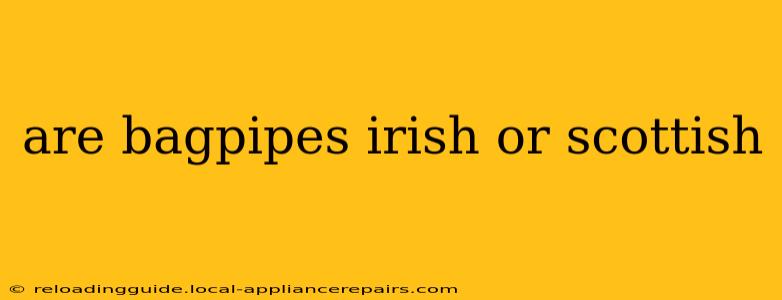Are Bagpipes Irish or Scottish? Unraveling the Celtic Connection
The question of whether bagpipes are Irish or Scottish is a common one, often leading to spirited debates among Celtic music enthusiasts. The simple answer? Neither exclusively. While both Scotland and Ireland boast strong and distinct bagpiping traditions, the instrument's origins are far more complex and span centuries and geographies.
A History Richer Than the Highland Mist
The bagpipe's history is shrouded in the mists of time, with evidence pointing to ancient origins across the Middle East and Europe. These early instruments differed significantly from the modern bagpipes we know today, but they share fundamental characteristics, like using a bag to hold air and reeds to produce sound. The evolution of the bagpipe involved various migrations and cultural exchanges, making it difficult to pinpoint a single origin point.
The Scottish Great Highland Bagpipe: An Icon of Scotland
When most people think of bagpipes, the image conjured is likely that of the Great Highland Bagpipe (GHB). This iconic instrument, with its powerful drone and dramatic sound, is undeniably associated with Scotland. Its use in military bands and traditional ceremonies cemented its status as a potent symbol of Scottish heritage. However, it's crucial to understand that the GHB, in its current form, is a relatively recent development, evolving over centuries.
The Irish Uilleann Pipes: A Unique and Intricate Instrument
Ireland's contribution to bagpipe history is equally significant, though often less widely known. The uilleann pipes (pronounced "ileen pipes") represent a unique and sophisticated variation. Unlike the GHB, which is played by blowing air into the bag continuously, the uilleann pipes use a bellows system, allowing for greater control and melodic flexibility. The uilleann pipes are a central instrument in Irish traditional music, showcasing a vastly different tonal quality and playing style compared to their Scottish counterparts.
More Than Just a National Symbol: A Shared Heritage
The reality is that bagpipes, in their various forms, have been played across numerous regions for centuries. Both Scottish and Irish bagpipe traditions developed independently, evolving their unique characteristics and musical styles. Attributing the bagpipe solely to either nation ignores the rich and complex history of this instrument, which encompasses diverse cultures and centuries of evolution.
Key Differences Between Irish and Scottish Bagpipes: A Summary
| Feature | Great Highland Bagpipe (Scotland) | Uilleann Pipes (Ireland) |
|---|---|---|
| Method of blowing | Continuous blowing into bag | Bellows system |
| Sound | Loud, powerful, dramatic | Softer, more melodic, nuanced |
| Reeds | Typically three drones and a chanter | Several drones and a chanter |
| Musical Role | Military bands, ceremonial, highland gatherings | Irish traditional music sessions |
In conclusion, the question of whether bagpipes are Irish or Scottish is an oversimplification. Both countries have vibrant and distinct bagpiping traditions, each deeply rooted in their unique cultural heritage. Understanding the nuanced history and evolution of these instruments reveals a far richer story than simply assigning national ownership.

